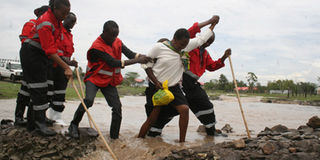Make use of traditional forecasters, Meteorological Service told

Rescuers help residents during a flood in the Ruai /Kamulu area in Nairobi. Traditional weather predictors have urged professional forecasters to incorporate indigenous knowledge in weather forecasting. PHOTO/WILLAM OERI
What you need to know:
- Professionals told local weather watchers have unrivalled indigenous knowledge.
- Floods, drought find communities unprepared because early warning systems are not used.
The Kenya Meteorological Service has been urged to fully integrate traditional weather-prediction systems to improve forecasts and deal with climate change.
Traditional weather predictors in Meru County on Wednesday said they have unrivalled indigenous knowledge that, if combined with modern methods, will help in forecasting and tackling extreme weather conditions.
One of the traditional forecasters, Mr Francis Mburugu, said there was a need for the two parties to offer weather forecasts that can benefit the community.
"Weather forecasting is an integral part of our day-to-day lives. Currently Kenya's forecasting infrastructure is in a wanting state and it will do us good if we embrace traditional weather predictors to improve it," he said.
He said Kenya's weather forecasting was "too general" and forecasters needed to make climate-related information more accessible to the local community.
Mr Mburugu spoke in Meru during a workshop on climate change organized by the Agricultural Sector Development Support Programme (ASDSP) in collaboration with the meteorological service. He underscored the need to incorporate traditional weather predictors as they had diverse knowledge on weather patterns.
"A large percentage of Kenyans still depend on the traditional weather forecasters. It is therefore imperative that joint researches are carried out by these two entities so that they come up with accurate predictions and information that will be used by the public for the improvement of their welfare," he said.
Prof Peter Kamau, a lecturer in meteorology and agriculture at Kenya Methodist University (KEMU), also rooted for the idea. He said drought and floods were becoming a frequent occurrence and catching communities by surprise partly because early warning systems are not used to alert residents about impending disasters.
Traditional weather predictors, he said, also make forecasts that are good but are not being used.
"These predictors are also revered for their (ability to predict) weather patterns. Meteorologists and researchers should be keen to work with them to understand their interpretations and spell the probable effects to the community," he said.
Meru County's director of meteorological services, Nyaga Kaburu, said farmers need to understand forecasters' interpretations of weather patterns.
He called on the media to disseminate the information for the welfare of the public, especially the farmers.
"We need the fourth estate to communicate our findings so that people can be in a position to make use of that information," he said.





